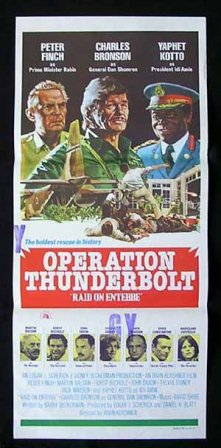
OPERATION THUNDERBOLT (RAID AT ENTEBBE)
US, 1976, 118 minutes, Colour.
Peter Finch, Charles Bronson, Martin Balsam, Sylvia Sidney, Horst Buchholtz, John Saxon, Jack Warden, Yaphet Kotto.
Directed by Irvin Kershner.
Operation Thunderbolt (Raid at Entebbe) is Entebbe again from Hollywood. Not star dominated (only by Charles Bronson) and not emphasising the "personal" interest, this more straightforward version is possibly less entertaining (and emotive) than Victory, but is probably more interesting. The main emphasis is on the raid - planned, questioned, rehearsed, accomplished. Peter Finch is good as the Prime Minister and Yaphet Kotto is allowed to show the ludicrous side of Idi Amin as well as his innate shrewdness. Martin Balsam bears the brunt of making the hostage scenes credible and with Sylvia Sidney instead of Helen Hayes, treatment is less "cute". However the hijackers' characters and dilemmas are highlighted less. A satisfying film of extraordinary events.
1. The title, the alternative title of 'Raid at Entebbe'? Its impact at the end of 1976, early 1977? Later?
2. The film was made quickly. How evident was this in technique, processing, the quality and depth of the screenplay, the exploration of the events, the danger of exploitation? How much value was there in this film at re-creating a contemporary incident, helping audiences understand it?
3. The impact on the audience of the real events behind the film: the experience of hijacking, terrorism, violence and possible death, the implications for Europe, for France, for Israel, for the Arabs, for Uganda?
4. The film was emotive in favour of Israel. In a balanced way, propaganda? How was the emotional side of the film portrayed, the passengers, the soldiers and the raid, the ending?
5. How well did the film quickly establish the plane and the flight the characters and the variety of characters? The seeming lack of attention to personal details about so many passengers? Was this an advantage for the film? The quick-sketching-in of the hijackers and even the moments of the hijacking? The brevity and the speed of the flight? The contrast with the people waiting at the Paris airport and the sign for the plane's being late?
6. The portrayal of the impact of the hijacking in Israel? The presentation of Rabin and his reaction to the situation the portrayal of him as a persona as a leader? His ability for discussion with his ministers and the opposition? His caution? The detailed presentation of the Cabinet meetings and their discussion, the varieties of approach for dealing with the hijackers from no compromise to discussion? The Leader of the Opposition? An exercise in democratic discussion and decision?
7. The presentation of the military personnel the military options? The speed in which plans were drawn up? The attitude behind Dan Sheratons and the other military personnel? The abilities for co-ordination,, explanation of the techniques to be used, the dramatic impact of the rehearsals and the aim for perfection, even in timing? The personalities of the young Israelis involved, their leaving their families for commando work? The personality of Jani?
8. The use of cross-cutting from the three different areas: the plane's journey and touchdown in Libya, the difficulties and the segregation? The release of some of the passengers? The continued fears? The role of Mrs. Bloch? The cross-cutting then to Israel? To the Ugandans?
9. The presentation of Idi Amin: how was he presented, as a public figure, the world's reaction to him even later? Amin's image, the varieties of dress, his entourage, his happy approach, the shrewdness underlying the sense of the ludicrous? His attitude towards the hostages? Their composing a letter to him? The important sequence of the telephone negotiations in the car and the Israel! Cabinet listening? An example of his innate shrewdness in leadership? The rights and wrongs of the Ugandan support of the hijackers?
10. The background of the negotiations, the hijackers and their demands, the Israeli response, the playing for time, the atmosphere of uncertainty, the letter from the Israeli hostages?
11. Within this framework, how well were the human elements portrayed, the focusing on Cooper and his personality, his helping the others, his relationship with the hijacker and the insight into the hijacker's character and hesitancy? The portrayal of Mrs. Bloch and her eventually being taken away and her disappearance?
12. The suspense in the flight to Entebbe, the personnel, their background, the length of the flight, patriotism and zest? The focus on Dan Shamaron and his expectations? The Israel Cabinet making their decision while the flight was in the air? The map to help people realize the distance flown and the difficulties? The fact that the Cabinet followed all the action by radio?
13. How much impact was there in the visual presentation of the raid, at Entebbe, the exercise of the strategies that had been rehearsed, the impact of the killing of so many Ugandans, the Ugandan soldiers' reaction to the terrorism, the terrorists and their deaths, the deaths of some of the hostages, Jani's being wounded and the impact of his dying in the plane? The overall success of the mission and world satisfaction at this?
14. The atmosphere of rejoicing at the return, the pro-Israeli sentiment and feeling at the end?
15. How helpful was the treatment? Realism, documentary style? A feeling of optimism that such rescues can be carried out in the modern world?